Ethics and Human Values are the core principles that shape our behavior and interactions in society. In the subject Ethics, we learn how values like honesty, respect, and responsibility help individuals lead a meaningful and morally sound life. These values are essential for building a harmonious and respectful world.
Previous year Questions
| Year | Question | Marks |
| 2013 | Ethics is a phenomenon with divergent dimensions. Comment. | 5M |
| 2013 | Define impartiality. What are its basic ingredients ? | 2M |
| 2013 | In your view, what should be the key moral values in public administration? | 2M |
| 2016 | What is the meaning of ‘Freedom of will’ ? | 2M |
| 2018 | What are the main values of the Civil Services ? | 2M |
| 2023 | State the distinctive features of human values. | 5M |
What is Ethics?
- Ethics is a normative science and a branch of philosophy, which determines what a sentient creature ought to do to differentiate the act as good or bad, right or wrong, and appropriate or inappropriate.
- The word Ethics is derived from the Greek word ‘Ethikos’, which means character. Hence, Ethics contains a set of principles that help us determine what is right or wrong.
- According to McKenzie, “Ethics examines the principles behind human habits and analyzes the reasons for their goodness or badness.”
- According to Shukraneeti Niti, “Ethics is the product of all the scriptures and the administrator of the social order. Therefore, it is the provider of these four efforts – Dharma, Artha, Kama and Moksha

What is Morality?
- An individual set of principles that guide one’s beliefs, thoughts, attitudes, behavior, and action. [BTABA]
- Morality defines personal character.
Difference between Ethics and Morality
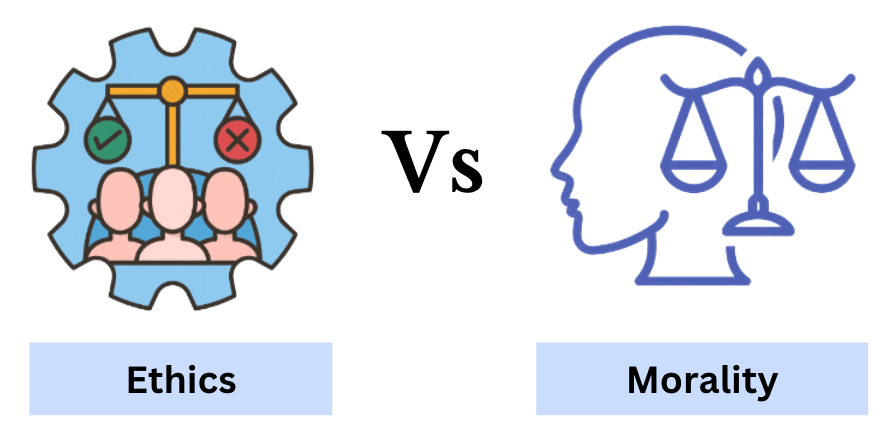
| Factors | Ethics | Morality |
| Definition | Code that society or a group as a whole adheres to | An individual set of commitments |
| Impact | Define social norms | Define Personal character |
| Locus | External | Internal |
| Subjectivity | Less | High |
| In practice | More theoretical | More practical |
| Examples 1 | A soldier killing an enemy in war – It is ethical as society sends him to kill | But it may be immoral because he/she thinks it’s wrong |
| Example 2 | Doctor refuses to abort in a medical emergency condition – It is unethical as medical science’s rule says – Save mother first | But it may be moral because he/she thinks that the fetus has the right to life |
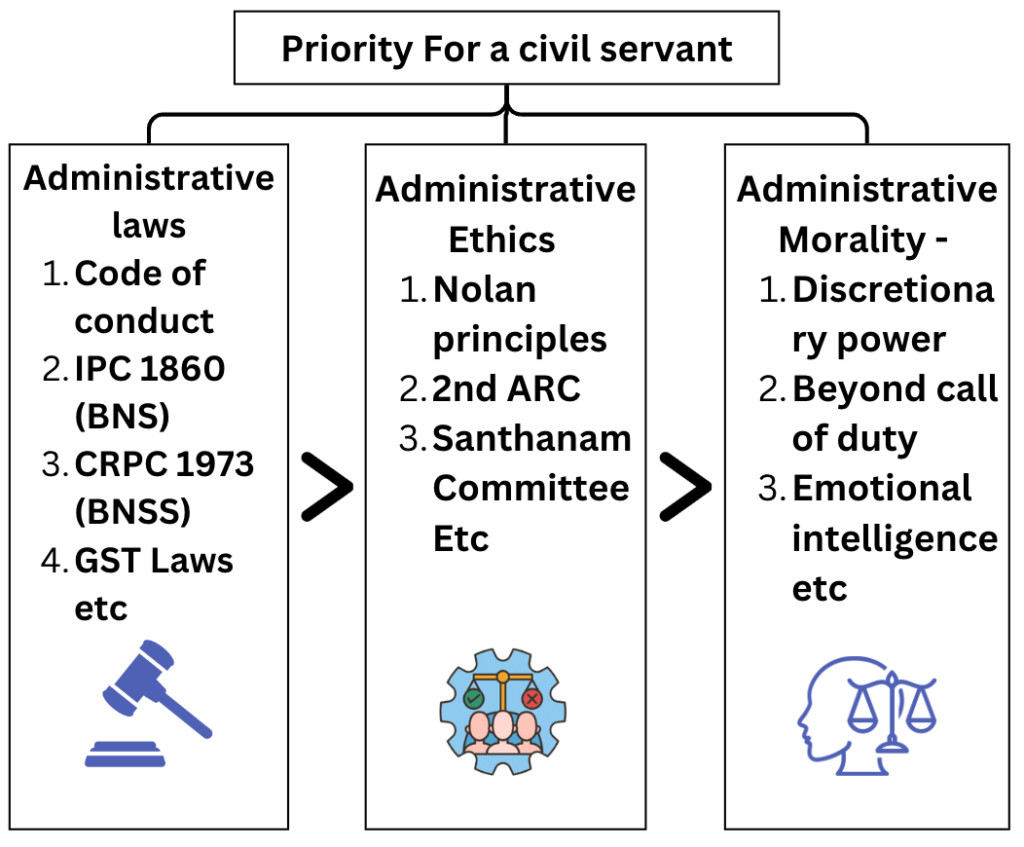
Consequence of ethics
- At the Individual level – Ethics is a source of identity, helps achieve higher goals and self-realization. And if ethics doesn’t exist then it leads to hedonistic tendencies, frustration, and sadness.
- Eg. of ethical individual = Shri APJ Abdul Kalam or honest bureaucrats like Shri Ashok Khemka
- Eg. of unethical individual = corrupt bureaucrat like Divya Mittal (ACB Raid)
- At the social level – Ethics contribute towards harmony, social capital, egalitarian society, and justice. In its absence fear, hatred, crime, apathy, inequality, intolerance etc arise in society.
- Ex – Recent mob violence in Bangladesh (due to the failure of the state) leads to brutal consequences because of unethical elements in the society
- At the Organizational level– Ethics leads to Professionalism, Efficiency, trust, teamwork, quality, customer satisfaction, and good work culture. In its absence corruption, inefficiency, nepotism, and favoritism may occur.
- Eg. of good work culture – TATA, Azim Premji Foundation, and Connect Civils 😀
- Eg. of bad work culture – The Volkswagen emissions scandal (Dieselgate 2015), Satyam computers scandal, the SEBI action Sahara group, Bollywood nepotism, etc
- At the National level – Ethics maintains secularism, democracy, the rule of law, liberty, socio-economic justice, and constitutional ideals. Its absence may lead to communal riots, regionalism, anarchy, civil war, hung assemblies etc.
- Eg. – Democratic turmoil in neighboring countries of India like Pakistan, Sri Lanka, and Bangladesh
- At the International level – Ethics promotes Sustainable development, sovereignty, free and fair trade, and humanitarian grounds. In the absence of ethics, conditions of terrorism, imperialism or colonization, aid curse, war, refugee, climate change, Matsya raj may be created.
- Eg. – 9/11 terror attack, Mumbai terror attack
What is Law
Law is a set of rules made by the government and enforced by courts to regulate human behavior and conduct.
Difference between Law and Ethics
| Factors | Law | Ethics |
| Definition | Set of rules created by government institutions to regulate behavior | Code that society or a group as a whole adheres to |
| Impact | Peace and order | Define social norms |
| Action 1 | Civil disobedience movement by Gandhiji – It was illegal as laws at that time were made by the British government and it was against the laws | But it was ethical because Indian society supported this movement |
| Action 2 | Persecution of Jews in Nazi Germany – It was legal because Hitler’s government made the rules | But it was unethical as world society condemned it. |
Types of Ethics

Meta ethics
- It helps to understand the theoretical origin and meaning of Ethics and Moral principles.
- It exists to assess the validity of Ethical theories
- Question arises –
- What is moral judgment?
- What is goodness?
- Analogy –
- What is cricket?
- Can gully cricket be called Cricket?
- Its elements are –
- Moral Realism (Universalism)
- Moral Antirealism (Subjectivism)
Normative ethics
- It investigates how one ought to act (what is good / what is bad).
- It is a litmus test for one’s behavior and offers punishment/reward thereafter.
- Questions arise –
- Is this action right ?
- Is this behavior good?
- Analogy – Is He/She playing good cricket?
- Its elements are –
- Virtue Ethics, deontology, teleology, Nishkam karma, etc.
Applied ethics
- Applying ethical principles to real-world situations and actions.
- It helps in solving practical and real-life problems using ethics.
- Question arises –
- Should we allow euthanasia?
- Analogy – Is mankading ethical?
- Its elements are –
- Medical ethics, Environmental ethics, sports ethics, business ethics, etc
Understand by Analogy
Below three pictures are related to cricket. Now understand how different types of ethics anticipate it.
- Meta ethics will answer what is cricket and can gully cricket be called cricket.
- Normative ethics will answer whether he/she is playing good cricket.
- Applied ethics helps in answering problems like – Is mankading ethical ?

Normative Ethics
It is further divided into three categories:-

Deontology
It is an ethical theory that suggests actions are good or bad according to a clear set of rules. In this, the main focus is on work and results don’t matter. It is supported by-
- Immanuel Kant
- Geeta –
कर्मण्येवाधिकारस्ते मा फलेषु कदाचन।
मा कर्मफलहेतुर्भूर्मा ते सङ्गोऽस्त्वकर्मणि ॥
- W D Ross
Teleology
It is an ethical theory that focuses primarily on good results, no matter what work you do. It contains –
- Ethical egoism
- Utilitarianism –
- Jeremy Bentham
- J S Mill
- Eudaimonism (Happiness as the Ultimate Goal, True happiness (eudaimonia) is not just pleasure but a fulfilling and meaningful life)
- Hedonism – Charvaka
यावत् जीवेत् सुखम् जीवेत्। ऋणं कृत्वा घृतं
पिबेत्। भस्मिभूतस्य देहस्य पुनरागमनं कुतः।
Virtue ethics
Virtue ethics is an approach to ethics that treats virtue as central. Virtue is often conceived as excellence or moral character. Hence in virtue ethics, a moral person can never do wrong things. For example, the Tactics played by lord Krishna in the Mahabharat War were ethical because he was a man of character. He was fighting for Dharma. This theory is supported by –
- Socrates, Plato (4 Cardinal virtues – WCTJ), Aristotle and Confucious
Some Ethical Concepts
Psychological Egoism
This doctrine proposes that human beings are innately selfish, and are only concerned with their individual advantages, pleasures, and welfare and have no concern or care for others.
- Ex – Traitors like Jaichand [Jaichand not only refused to help Prithviraj but also allied with the invading king Muhammad of Ghor]
- Ex – Match fixing in cricket [Innate selfishness > Sports ethics]
Criticism-
- In many situations, people help others at the risk of their lives and hence show selfless characteristics.
- Eg.- Soldiers in battle situations sacrifice themselves to save their comrades.
- Eg.- Many parents struggle unmindful of personal comfort for the welfare of their children. There are many instances of mothers laying down their lives in an effort to protect their children.
- Real-life example – Pannadhai sacrificing her son for the sake of Mewar Kingdom
Ethical Egoism
People should act according to their self-interest. Acting in self-interest means that we should do what maximizes our happiness and minimizes our unhappiness (Hedonism).
Proposers
- Thomas Hobbes, Adam Smith and
- Mandeville – Self-preservation is the first law of existence
Problem – Sometimes Ethical egoism leads to ethical actions and other times unethical actions
- Eg. – Stopping smoking for your satisfaction leads to ethical action.
- Eg. – Taking divorce for each other’s goodness by parents leads to unethical action as it negatively affects the development of their offspring.
Social contract theory of Thomas Hobbes
Thomas Hobbes in his book Leviathan, gave this theory. According to him, individuals agree to give their liberty into the hands of a sovereign, on the sole condition that their lives are safeguarded by sovereign power. They do so to avoid the ‘state of nature’.
- State of nature – A society without rules, politics, or government. In this state, people are free to do what they please, with no defined duties or obligations.
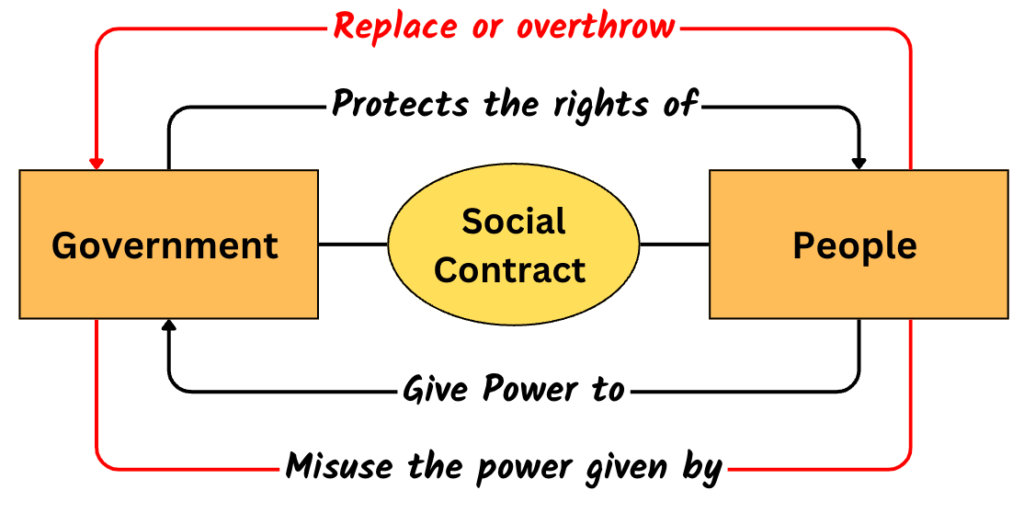
Moral Relativism
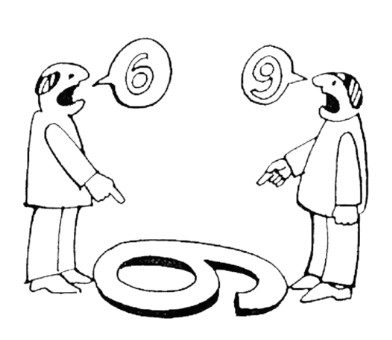
Moral judgments are relative to the individual or particular societies and are not universally applicable.
Two Types –
- Moral Subjectivism – Right and wrong is a matter of personal opinion.
- Eg. – Opinion on same-sex marriage
- Cultural Relativism – Within a given culture, moral standards may be true for that culture but not for some other culture.
- Eg. – Polygamy for Hindu vs Muslim culture
- Positive (+) of relativism – Promote diversity
- Negative (-) of relativism – Injustice in some sections
Moral Objectivism
There are objective moral truths that some actions are right for all people at all times and that others are wrong for all people at all times.
- Ex – Killing an innocent person is universally wrong or speaking the truth is universally right thing in all cultures
It is supported by –
- Consequentialist – If the consequence of an action is right, the action is always right
- Deontologist – If means (Set of rules or principles) are right, the action is always right
Doctrine of determinism
- Decisions and actions of human beings are causally determined by external forces. Hence they are not responsible for their actions.
- His/her actions depend on genes, Brain, and environmental factors
- Aristotle promoted the idea of determinism
Factors (Determinants) –
- Time (Ex – Slavery was considered ethical in the 18th century, and Section 377 was taken down), Sati (Sacred/ethical thing in ancient India)
- Custom – Place (Thalaikoothal, Abortion)
- Circumstances (Need vs Greed)
- Eg. – A hungry person steals – Is he Immoral? [Stealing for need]
- Eg. – A corrupt officer involved in embezzlement
- Law (Triple Talaq, Nazi Germany)
- Means (Intentions) and Ends (Consequence)
- Actor – Person doing the act
- Eg. – Bhima Killing Duryodhana is considered moral because Bhima was on Dharma side, even though he violated the rule of Yudh
- Eg. – Some concession on Juvenile crimes because his brain is not fully developed to differentiate between right and wrong
- Eg. – Section 84 of IPC [A person of unsound mind is not punished for an act]
- External Environment
- Eg. – Someone acting on gun point
Doctrine of Freedom of will
Actions that are not guided by external factors or those actions that are not motivated by necessity.
- 3 Conditions (Freedom of will is applied only when these 3 conditions are fulfilled) –
- Availability of Alternatives
- Capacity to act
- Awareness about circumstances
- Eg. –
- Adventure sports
- Court Judgement without any prejudice or pressure
- Criticism – Freedom of will cannot exist in a world governed by necessity.
- Socrates (Good knowledge = Good action) V/S Aristotle (Action varies because of freedom of will)
Doctrine of Double Effect
Actions have both positive and negative consequences and hence it is difficult to decide whether the action is good or bad.
- Eg. – Killing in self-defense
- Eg. – Collateral Damage
- Eg. – Mother vs fetus
Moral agent must be responsible for both outcomes. Moral agents must try to outweigh good outcomes over bad.
Human Values
Values are guiding Principles, Ideologies and beliefs which one holds dear and aspire to achieve
- Ex – Justice, Courage, Temperance etc
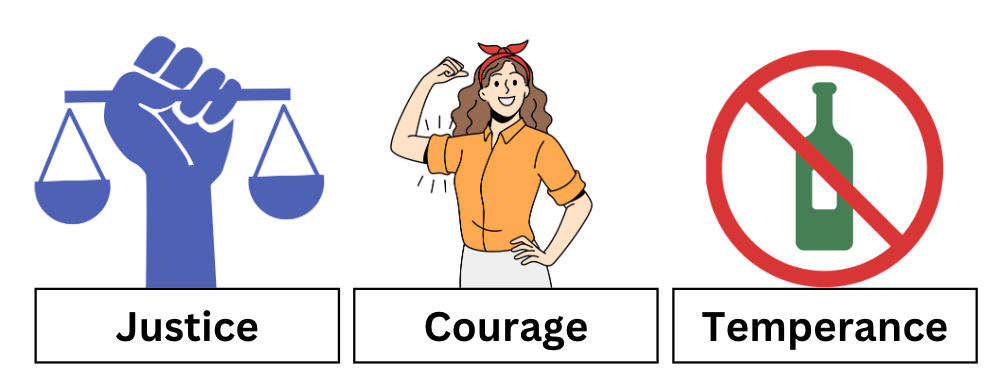
Vices – Vices are Undesirable practice, behavior, or habit that is generally considered wrong in a society
- Ex – Corruption, violence, dishonesty etc
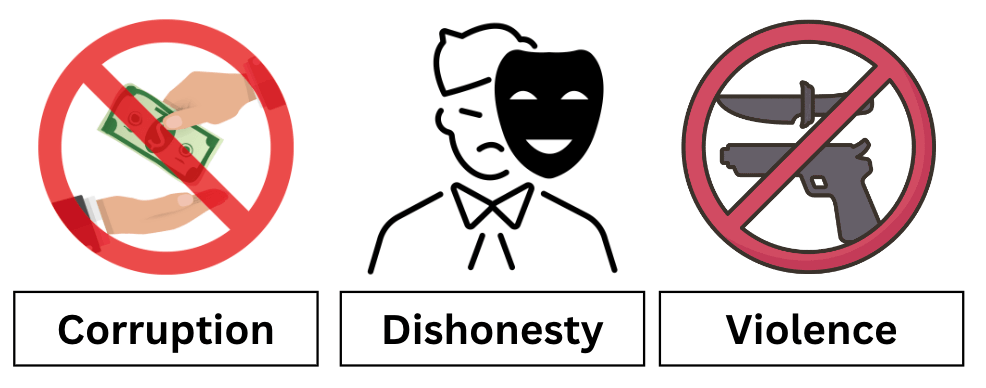
Classification of Values
Values are classified into four categories:-

Based on Objectives –
- As a means (Instrumental value) – Money, Nutrition
- As an end (Intrinsic value) – Love, Freedom, Health.
Based on hierarchy –
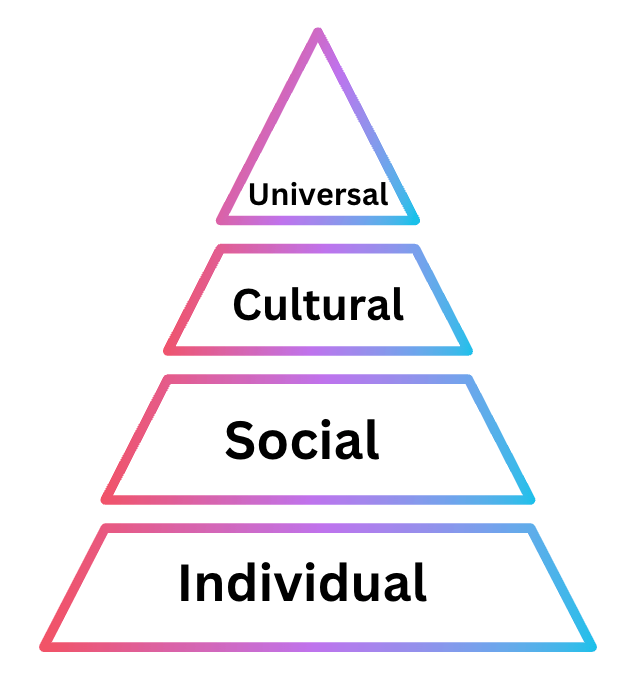
- Universal values – Freedom,Happiness, Intelligence, Love
- Cultural Values
- Social Values
- Organizational Values – excellence, efficiency, discipline, work commitment, innovation,
- Individual values
Based on source –
- Internal values ( spirituality, Self Esteem, mindfulness)
- External values (Respƒect, Love, physical appearance)
Sectoral classification –
- Economic values – Efficiency
- Environmental Values – Sustainability
- Scientific Values – Accuracy, intellectual honesty, etc
- Administrative Values – Proposed by 2nd ARC, Nolan committee, etc
- Political values – Transparency, accountability, etc
- Democratic Values – Legality, justice, Rule of law, equality, etc
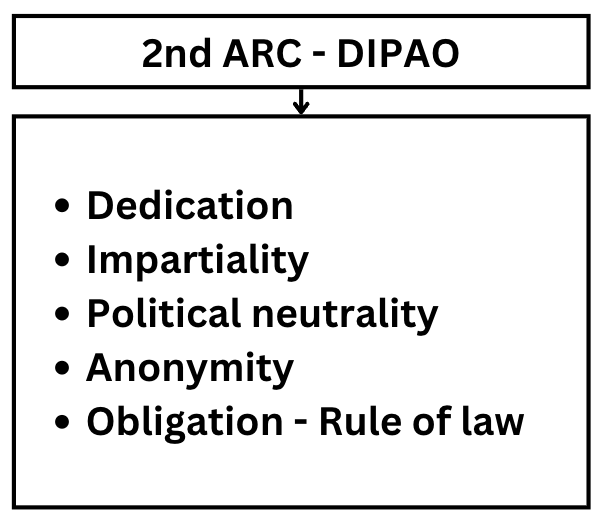
Features of human values
- Universality – Values like Truth, non-violence, honesty, integrity, peace and cooperation, etc
- Depends on culture and context –
- Ex – Sati Pratha [Accepted by Ancient Indian society as a value]
- The foundation of morality and ethics – Human values are considered the moral foundation that guides individuals in distinguishing between right and wrong
- Innate and Acquired –
- Few values like team work, Cooperation are acquired during schooling and other extracurricular events
- Some values like compassion and empathy are innate in many individuals or a particular gender may have a higher proportion of it
- Dynamic and Evolving Nature – Values evolve with time
- Gender equality (Feminism in India)
- Environmental values are evolving
- Interconnectedness – one value often reinforce another
- Ex – Empathy reinforce charity
- Ex – Compassion reinforce non violence
Values examples
Trick – EAT OFF TOPIC DRAGONFLIES HMTJK
(1) Empathy

Ability to understand the emotions of other people and treat them accordingly.
Significance
- This helps in building good relationships with people.
- This bond helps in persuasion. When you understand emotions, they trust you.
- Important to provide better service to citizens.
Examples –
- Eg. P Narhari – Worked for disabled people being DM of Indore [Panchsparsh therapy].
- Eg. Prashant Nair – Operation Sulaimani – Free food for hungry people.
- Eg. Mahatma Gandhi – He threw away his fancy barrister’s suit and collar, wrapped himself in a dhoti and established the Sabarmati Ashram, where he lived from 1917 to 1930. Ashram life was about stepping into the shoes of peasant farmers.
(2) Equality
Treating like cases as like, giving the same opportunities, rights and status to people with the same credentials. This may be Political, economical, Gender or social equality.
Significance –
- Because inequality leads to chaos, wastage of resources (Consumerism) and violation of basic human rights (Deprivation of basic needs like Food, shelter and clothes) ➡️ leads to revolutions like the Russian revolution
- Constitutional goal [Preamble explicitly mentions equality of status and opportunity].
- Equality is a necessary ingredient for a peaceful and prosperous society.
- Inequality is undemocratic and exploitative. It suppresses talent and leads to moral degradation.
Examples –
- Eg. Nelson Mandela – Anti-apartheid activist , Fought for equality of black with whites
- Eg. Martin Luther King – One of the most prominent leaders of the civil rights movement in the USA.
- Eg. Jean jacques Rousseau – Without equality, there can’t be liberty
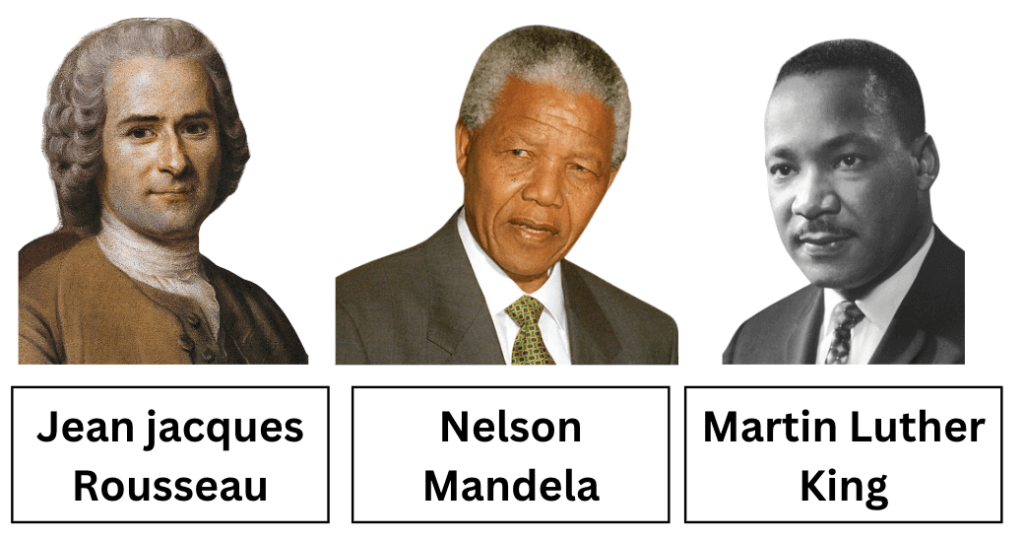
(3) Accountability
Accountability is answerability in ethics. It is a sense of being answerable for final consequences.
Significance
- It creates trust
- Improves performance
- Eliminates confusion- It promotes ownership [People value their own work]
- A Civil servant is accountable to his/her senior, government and people whom he is serving. This means that civil servants must provide the same standard of free, frank, impartial, and responsive advice irrespective of the political party in power.
Examples –
- Eg. Lal bahadur Shastri was the first railway minister who resigned from office following a major train accident as he felt moral responsibility
- Eg. ISRO Chairman Satish Dhawan accepted responsibility for Dr APJ Abdul Kalam’s failure in 1979 when the Dr Kalam-headed SLV-3 Mission satellite fell into the Bay of Bengal.
(4) Adaptability
The Quality of being able to adjust in new conditions.
Significance
- Job of a civil servant is very dynamic. They are jack of all trades but master of none. To deal with different organizations/people, civil servants have to be adaptable to new environments.
- However caution should be kept in mind that you stick with your core values and principles. Adaptability does not mean imitation (Nakal).
- It is not the strongest of the species that survive, nor the most intelligent. It is one that is most adaptable to change – Darwin
Examples –
- Eg. Kiran Bedi – She made herself adaptable in various roles like traffic police officer, IG in tihar Jail or reform in Goa
- Eg. Mahatma Gandhi – Despite spending more than 20 years in South Africa he soon became adaptable to India and its problems. However, before taking any action he roam around the country to know it better
- Eg. APJ Abdul Kalam – Being at DRDO, ISRO, university professor or president of India, sir APJ kalam did justice to each post. He was so well adapted to each organization.
(5) Temperance
Moderation in action, thoughts or feelings.
Significance
- Intemperance is the mother of all other vices. In public services an intemperate person does evils like corruption, bribery, embezzlement, sexual harassment at workplace.
- Intemperance in food will lead to obesity and other health problems.
- Most of the crimes happen under the influence of Alcohol.
- A public servant with temperance enjoys respect and trust among his/her subordinates.
- Temperance works as an internal audit system.
Examples –
- Eg. Gulabi gang – A Self help group to stand against liquor abuse by their husband.
- Eg. Article 47 of the Directive Principles of State Policy (DPSP) states that the state should take steps to improve public health and prohibit the consumption of intoxicating drinks and drugs that are harmful to health.
- Eg. Vishakha guidelines
(6) Tenacity
The quality of being very determined.
Significance
- A civil servant has to bear political pressure, senior’s interference, goons, tax evaders, frequent transfers, spoiled work culture, personal life problems etc despite all this, he/she has to continue her duty. As a face of the government, she can’t afford to give up.
- Ex – An IAS officer admitted that he had to work for 18 hours per day for many days during the Mumbai bomb blast case. In such a case in spite of no recognition of your good work, you need to keep going.
Examples –
- Eg. Arti Dogra ma’am – Despite physical challenges, She is known for her administrative efficiency.
- Eg. Let say a person from an influential family commits a crime and you have a lot of pressure not to file an FIR. In such a case you can’t give up as the victim’s family expects justice, you are bound by the oath taken and most importantly you can’t succumb to the pressure to boost the ill motive of the accused. In such a case you have to set the right example by filing FIR.
(7) Tolerance
Willingness to accept belief, practice or behavior that is different from your own, even though you disagree with them.
Significance –
- This ensures basic fundamental rights of people like freedom of expression, human dignity and religious practices.
- A tolerant society is much more diverse and peaceful than intolerant one. Lack of it leads to violence. In a globalized world where communities are much more diverse than before, tolerance is necessary.
- As a civil servant, being tolerant is very necessary as you have to be within the bounds of the law. In case you don’t have enough evidence you can’t take action against anyone. Hence for that period, patience and tolerance is necessary.
- This age of social media provides an opportunity to all of us to interact with a large number of people and gain wide knowledge/perspective. Without tolerance, these healthy debates or conversation converts into trolling and abuse. Hence intolerance leads to wastage of this beautiful resource.
- A civil servant posted in another state than his/her home can face difficulty in adapting if he/she is not tolerant with the culture of that state. He/She should be tolerant of new language, culture, customs, views and opinion for effective discharge of his/her duty and work for reform.
Examples –
- Intolerance leads to problems like ISIS, civil war in Sri Lanka.
- It will help in avoiding incidents like discrimination and violence with Indian students in Australia.
- India being the most tolerant country and hence peaceful and diverse.
- Successful emergence of Jainism and Buddhism out of hinduism and simultaneous existence of all three.
- Hindu-Muslim unity in medieval time to till date and multi linguistic India.
- India has been home for persecuted communities ranging from Judaism, Zoroastrianism, Tibetan and even christianity.
- The Highest result of education is tolerance – Helen keller.
- Tolerance is not a sign of weakness but a sign of strength – Dalai Lama
- Intolerance is itself a form of violence and a obstacle to the growth of true democratic spirit – Mahatma Gandhi
- I might disagree with what you say, but I will defend to the death your right to say it – Voltaire
(8) Transparency
Transparency is openness in work. A concerned stakeholder should be able to see through your work when required.
Significance
- Transparency enables following rules and regulations and hence curbs the misuse of resources and hence increases the efficiency.
- Increases the confidence and trust of stakeholders. Lack of transparency results in distrust and a sense of insecurity.
- Enables concerned stakeholders to make the right decision. For example a transparency in candidate profile in elections would enable voters to choose the right one.
- Will curb the menace of fake news.
- Promotes teamwork.
- Administration should not only be fair but appears to be fair.
Examples –
- Eg. Shri P Manivannan [IAS officer batch 1998] – Installed CCTV cameras in his office to give the public an extra eye.
- Eg. Aruna Roy – Former civil servant an RTI Activist – RTI Act 2005
- Eg. Technology
- AEPS (Aadhaar Enabled Payment System]
- GeM [Govt E Marketplace]
- CCTV
- Biometric system
- Eg. Social Audit – society for social audit accountability and transparency rajasthan (SSAAT)
(9) Objectivity
Being based on the facts and not influenced by personal feelings, beliefs, imagination or perceptions.
Significance
- To avoid conflict of interest.
- It will increase credibility and trust among people.
- Efficient use of resources.
- To attract a better talent pool when recruitment/promotion/transfer is based on objective lines.
- Those who have been rejected would get to know why so and hence chances of improvement for them.
- Reduces time delay in decision making Promotes transparency.
- Helps you to overcome your bias or prejudice.
- If you are objective, you would seek both sides of the story and people would present you both. This will enhance the sanctity of the decision.
Examples
- Recently, OSCAR has abandoned its new category – Popular award. This is because this award did not have any clear objective criteria to select the winner and hence raised question on its sanctity
- Swachh survekshan ranking, Institution of eminence ranking, air quality index etc policy measures on clear objective parameters would really reflect best among many participating.
- Clear objective criteria to select candidates by UPSC/RPSC [Pre/mains/Interview]
(10) Fairness
Taking decisions without favoritism or discrimination.
Significance
- To maximize efficiency and better utilization of limited resources.
- To give equal opportunity to all.
- It will increase trust in you in future endeavors.
- It promotes people’s participation. If treated fairly they will be happy to contribute to a cause. For example OP Munjal (founder and chairman of Hero Cycles) and workers relationship.
- Not treating fair, give people justification for illegitimate means to demand their rights.
- For example doctors in government hospitals went on strike due to unfair treatment with them. Initially there were warnings but nobody paid attention. Strike was statewide and it led to the death of 3 terminally ill patients. They justified their action citing long unfair treatment with them.
Examples –
- Eg. Martin Luthar king Jr – Fought for the fair treatment of black Americans
- Eg. Hero cycles – This organization is known for fair treatment to every person associated from Sweeper to CEO. When exchange rate made windfall gain to O P Munjal sir, he distributed the gain equally in managers, employees and even dealers. This fairness is reflected in the loyalty of workers. They were all ready to spend extra time in the factory when demand spurted.
(11) Forgiveness
To stop feeling resentful for someone for an offense, flaw or mistake
Significance
- Revenge is detrimental to both sides.
- An eye for eye will make the whole world blind – Mahatma Gandhi
- Before you embark on the journey of revenge, dig two graves – Confucius
- Makes us feel content
- To err is human, to forgive is divine (Alexander Pope)
- Forgiveness can’t change the past but it can change the future
Examples –
- Surrender cum rehabilitation policy by central government for Naxals.
- Delhi to Lahore Bus service [Atal Ji] Forgave Pakistan for its past deeds and tried to make good relationship].
- Nalabana sanctuary [Chilka lake] – Forest officials decided to forgive bird poachers in the sanctuary and offered them jobs in a bird protection camp.
(12) Fortitude
Mental strength that enables a person to encounter pain or adversity for a long time with courage.
Significance
- An administrator must retaliate at the right time (after collecting enough evidence), the right place [with well thought consequences] and using the right law.
- Be it political pressure, direct threats from goons, peer pressure or family pressure, Fortitude is a must to maintain the sanctity of your post.
Examples –
- Eg. BR Ambedkar – It is his fortitude that he spoke out against discrimination for long. He did not give up
- Eg. Gandhiji embraces fortitude to fight against Britishers anger, not to provoke it. He said that through our pain we will make them see their injustice
(13) Prudence
It’s a practical use of wisdom
Significance
- Maximum use of limited resources.
- To avoid unnecessary risks
Examples –
- Eg. Surendra Kumar Solanki – By training women in solar power, he solved 2 problems – Problem of power in remote areas and women unemployment
- Eg. Indian army tactics – Flooding sugarcane fields with water and trapping the Pakistani tanks in the mud (Battle of Asal Uttar)
- Sometimes prudence outweighs muscle power even in direct combat
- Eg. MS Dhoni – Along with his physical aptitude, Dhoni is known for his wise decisions behind the wicket
(14) Perseverance
Perseverance is the ability to continue trying to do something despite difficulties, failure, or opposition.
Significance
- The greatest glory in living lies not in never falling, but in rising every time we fall – Nelson mandela
Examples –
- Eg. Jack Ma – Founder of Alibaba (181 Billion dollar company), was rejected as many as 30 times in various job interviews.
- Eg. Thomas alva edison – As an inventor, Edison made 1,000 unsuccessful attempts at inventing the light bulb.
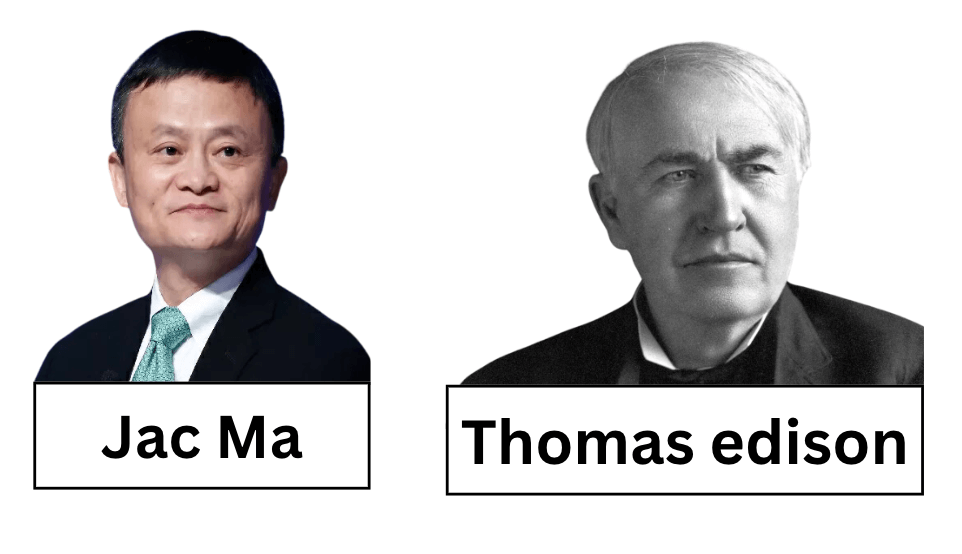
(15) Integrity
Strict adherence to moral principles irrespective of place, time and context (complete refusal to be compromised).
Significance
- Integrity in the workforce increases efficiency of the organization.
- It increases trust b/w various stakeholders.
- Helps in taking the most appropriate decision while in a dilemma. Avoid situations like conflict of interest.
- For example, An officer with Integrity would never succumb to the pressure of seniors, relatives or any family member even if he/she has to compromise with personal relationships at that moment. He/she would do the right thing only because it is right.
For example, An officer with Integrity would never succumb to the pressure of seniors, relatives or any family member even if he/she has to compromise with personal relationships at that moment. He/she would do the right thing only because it is right.
- Eg. Satyandra Dubey
- Eg. Mahatma Gandhi
- Chora Chori incident
- Harmony in thought, Speech and action.
- He was ready to help Britishers in WWII as it was against his moral principles to take advantage of the vulnerability of Britishers at that time. Also as a part of the empire, he thought it was the moral duty of India to help Britishers at that time while keeping the demand for freedom at highest priority.
- Wisdom is knowing the right path, integrity is walking on it.
(16) Impartiality
- The quality of not being biased or prejudiced
- Taking decisions based on objective criteria
- Sardar patel while addressing the first batch of civil servants called impartiality as one of the key pillars for administration.
(17) Commitment
Quality of being dedicated to a cause
Significance
- To build trust.
- To Increase the efficiency of the organization.
- If you are committed to a work, you need no external motivation. It gives you a sense of accomplishment during the journey itself.
- To make oneself disciplined. When you are committed to something you accept no excuses.
Examples –
- Poma Tudu – (AS officer who walked for 2 hours to meet tribals on hill and listen to their grievances.
- Neeru Yadav – Known as hockey Sarpanch (Jhunjhunu Girls education), committed to work towards women empowerment
- Shyam Sundar Jyani – Committed for the last 25 years for afforestation in the Indian state of Rajasthan.

(18) Compassion
Feeling that arises when you are confronted with another’s suffering and feel motivated to relieve that suffering.
Significance
- Most of the policies are for destitutes, disables, discriminated and poors. Compassion towards them would motivate an officer to work tirelessly for the effective implementation.
- Compassionate leaders are effective.
- It will give self contentment [Even If your work is not recognised officially, you would keep going].
- Help you better connect with the masses.
- It will do away the perception of arm chair bureaucracy.
- It will make you proactive rather than reactive in taking actions.
- Will reflect the democratic attitude of bureaucracy.
Examples –
- JK Soni Sir – Charan paduka Abhiyaan and Raktkosh Foundation.
- “A life not lived for others is not a life – Mother Teresa
- India’s compassion towards Nepal earthquake victims, Vaccine diplomacy etc.
- Eg. Love and compassion are necessities not luxuries. Without them, humanity can’t survive – Dalai Lama

(19) Contentment
Contentment is a mental or emotional level of satisfaction and sufficiency. This leads to a happy life. (Happiness is self contentedness)
Significance
- It makes us free from greed, envy and evil means. Hence a content civil servant would never think of Bribe or any other illegitimate means to make money.
- It makes us more generous.
- It allows us to appreciate what we have and utilize it fully.
- It promotes virtues like Altruism.
- It makes you more trustworthy and respectful [Very important virtues to be possessed by a civil servant]. Ex – Manik Sarkar CM of Tripura is trusted by people of state for so long as he lived a simple, content life.
- Even if your work is not recognised, it keeps you moving. Contentment from work is a source of eternal motivation.
- Contentment is the greatest wealth – Buddha
Examples –
- Lal bahadur Shastri
- APJ Abdul Kalam – Entered President’s house with a suitcase and exited with the same.
- Manik Sarkar CM of Tripura – Sarkar did not contest the 2023 elections. He revealed that he had done so in order to pave the way for younger leadership.
(20) Cooperation
Process of working together for common cause, mutual benefit or same end.
Significance
- It will utilize human resources very effectively. Remember the whole is more than the sum of its parts (एक और एक ग्यारह).
- More ideas, More resources, better outcomes.
- Better policy implementation (mass movement).
- Would create a bond among employees and hence it will take care of problems like discrimination, back biting, sexual harassment, indiscipline etc.
- Minimize the disputes among members.
- United we stand, divided we fall.
- Talent wins games but teamwork wins championships – Michael Jordan
- If everyone is moving forward together, then success takes care of itself – Henry Ford
Examples –
- Dr Verghese Kurien – Build Amul with the cooperation of farmers.
- Shyam Sunder Paliwal– with the help of Peepalantri village people [Ecology, Beti bachao]
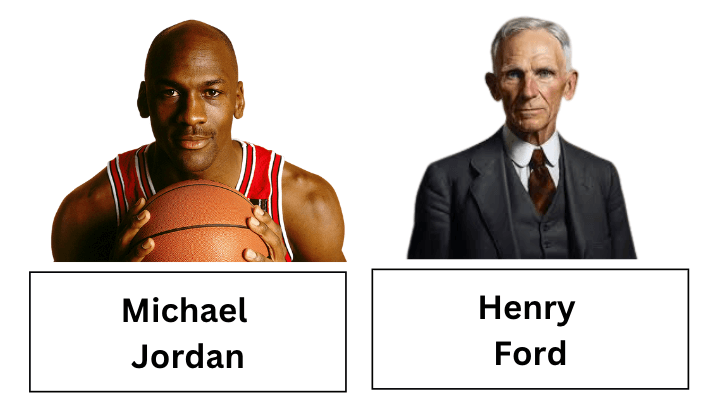
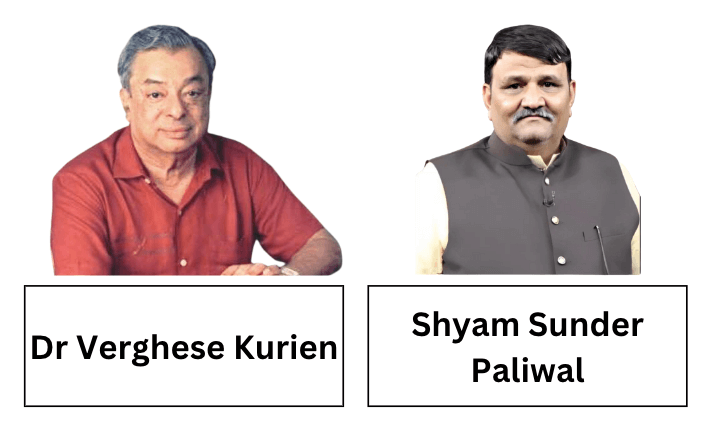
- ISRO – In Mangalyaan and Chandrayaan, great teamwork.
- Similarly only an effective team work can lead to the goal of Gaganyaan. This includes space scientists (Rocket, crew model, escape system), air force experts (To recruit pilots for space missions), Bio engineers (Life support in space), Physics scientist (Anti Gravity), foreign agencies (To train the astronauts, as still we are developing that facility).
- Ancient Indian culture – The Indian village economy is a perfect example of teamwork. There was division of work and a carpenter would provide his service and get other needs fulfilled in return.
- Indian epics like Ramayana show the importance of teamwork in getting Mata SITA back from Lanka. Lord Rama did not hesitate to take help from Vanara.
(20) Courage
Ability to control fear in a difficult/dangerous situation.
Significance
- Courage is not absence of fear but triumph over it and taking the right decision.
- Courage is mastery on fear, not absence of It – Mark Twain
- It helps in fulfilling your duty- An IRS officer need courage to make raid, An IPS/RPS officer need courage to any decision to control mob (Despite risks he/she has to take some decision), An IAS/RAS officer need courage to stand against any political lobbying, An foreign officer need courage to look confident at world platforms.
Examples –
- Mridul Kacchawa sir – Mridul along with his team sent 44 infamous chambal dacoits and 12 notorious criminals to jail in just 11 months
- Durga Shakti Nagpal – Action against sand mafia in greater Noida.
- TN Seshan – Ex chief election commissioner known for his courageous decision for electoral reforms.
- Gandhi Ji – Shaking the British empire with a pinch of salt.
- Rani Laxmi Bai – Fought with Britishers in 1857 revolution.
(21) Discipline
Discipline is action or inaction which is to be followed in accordance with a system of governance.
Significance
- Increase focus and hence efficiency.
- Indisciplined work is like Brownian motion (Random) and takes the organization nowhere.
- Respect and hence Trust [People would trust a disciplined civil servant more than other].
- Self discipline is Important to lead a healthy life [Eating right, no smoking. early rising etc].
- Either suffer the pain of discipline or pain of regret
Examples –
- E. Sreedharan – Completed the Konkan Railway within 8 years.
- The Indian army is known for its discipline.
- Akshay Kumar – Known for going to bed at 9 PM and waking up at 4 AM early in the morning.
(22) Resilience
- The capacity to recover quickly from difficulties.
- Eg. Dr. Kiran Bedi once said, she never invests in heavy furniture to keep her ready for transfer.
- Eg. Dr Ravindra Goswami – The then Bundi Collector, Played the role of a doctor (As he himself was an MBBS) when doctors in the district were on strike.

(23) Gratitude
A strong feeling of appreciation to someone for the help he/she has done to you
Examples –
- Concept of Rin in Indian Society
- Rishi Rin to show gratitude towards teachers
- Bhuta rin to show gratitude towards nature, animals and plants

(24) Non violence
Non-violence doesn’t just mean not doing violence; it’s also a way of taking positive action to resist oppression or bring about change
Significance
- IPS/RPS officer embracing non violence would restrain himself/herself from custodial torture and would use other tactics.
- Lead people to adopt vegetarian diets which would help in saving water and energy.
Examples
- Mahatma Gandhi
- Jainism
- Buddhism
(25) Loyalty
- Showing a firm support or allegiance to a person or institution.
- Civil servants should be loyal to the constitution, law of the land and the people.
(26) Leadership
- A leader is one who knows the way, goes the way, and shows the way.
- Eg. Sardar Vallabhbhai Patel, Sam Manekshaw.
(27) Solidarity
Unity or support for the members of a group.
Significance
- Civil servants need to work in solidarity with different department heads and subsequent members.
- Moreover solidarity to humanity implies utmost commitment to the destitute and marginalized. It is this group which needs the most attention of a public servant. Poverty, discrimination. oppression etc leads to isolation of this group from the larger community which is opposite of solidarity.
- Political solidarity based on common constitutional goals leads to constructive politics.
- Families are bound together with love and solidarity. An efficient civil servant must have a peaceful and happy personal life.
Examples –
- Anna hazare Ji – Ralegaon siddhi
- Armstrong Pam – Made a road using crowdfunding.
- India’s Vasudhaiva Kutumbakam and Aththi Devo Bahvo are a reflection of its solidarity towards all humanity.
- Social solidarity helps in avoiding recent problems like communal violence and mob lynching. Solidarity even mitigates the gender gap b/w men and women.
- Economic solidarity promotes self help groups.
(28) Simplicity
- Eg. Shri Manik Sarkar – Poorest Chief Minister With Bank Balance Of 2,000 [As declared by him in election affidavit].
- Eg. Late Manohar Parrikar – Ex CM of Goa and defense minister, A down to earth personality.
- Eg. Shri Babulal Kharadi (Tribal development minister) – still lives in a mud house.
(29) Scientific temperament
- Eg. Dr Samit Sharma – A Rajasthan govt IAS officer, An MBBS by degree, brought revolution in generic medicine.
- Eg. Laxman Singh – Chauka technique for water conservation From Laporiya village (Near Jaipur).
- Eg. Rukmani Riar (IAS) – The then collector of Hanumangarh district won the National E-Governance award.
- Eg. Chinmayee Gopal (IAS) – Mushroom farming in Tonk district with the help of women self help group (Innovation in agriculture).
- Eg. M.S. Swaminathan – Father of Indian green revolution.
- Eg. Sam Pitroda – Father of IT revolution in India.
(30) Honesty
- Eg. Shastri Ji – During freedom fight, while he was in jail, he was given 15 days parole to spend time with his sick daughter. Unfortunately she died on that day itself. Shastri Ji performed the last rites and returned to jail. That was the level of honesty.
(31) Humility or Modesty
The attitude that you have no special importance over others and treating yourself as par with others.
Significance
- Villagers can easily recall a humble officer even 20+ years later.
- It will enable a positive work environment – If the head of the organisation is humble, others will feel privileged to work with him/her and would contribute their maximum.
- A humble officer listens grievances patiently and it gives people assurance that their complaint will be taken care of.
- If you are humble, people will be more free to give honest opinions and feedback.
- It Breeds loyalty – If you are humble, people will be loyal to you.
- Civil servants are jack of all trades and master of none. They have to work with some expertise in that field. In such a case, humility is very essential.
- Eg. APJ Abdul Kalam Sir – Known as a caring and loving president by the whole staff of the president house. One of the chefs recalled that whenever there was a third dish (one extra than regular), he would ask if there was a festival today. This incident shows he treated himself as par with others in every aspect
(32) Justice
Legal or philosophical parameters on which taimess is administered.
Significance
- Injustice anywhere is a threat to justice everywhere .
- Justice is truth in actions.
- When we all see justice, then we all see peace.
Examples –
- Udaipur district collector Tarachand Meena – Mission Kotda for tribal development.
- OPERATION ASMITA – By Collector Renu Jaipal to save the dignity of women and daughters.
- Jaishan Shakti – Women empowerment Tina Dabi ma’am
(33) Kindness
- Compassion = Empathy + Kindness
- i.e in compassion you feel for others and try to help. In Kindness you just help others.
- Compassion has a deeper and personal feeling.
- Eg. A beggar – A kind person offers money to him and continues to walk. A compassionate person would talk to him, would try to know his problems and then would help him/her in the best possible way.
(34) Generosity
- The quality of being kind and generous.
- Generous businessmen like Azim Premji, Ratan TATA, Shiv Nadar, etc
(35) Obligation
The condition of being morally or legally bound to do something.
Obligations of a civil servant –
- Following law of the land
- Maintaining absolute integrity
- Protect official information with the utmost care
- Following Code of conduct
- All India service conduct rule 1968
VICES
- Vices are Undesirable practice, behavior, or habit that is generally considered wrong in a society.
- Eg. – Corruption, Apathy, Slothfulness etc.
Vices Examples
- Being silent against wrongdoings
- Violence
- Slothness
- Apathy
- Corruption
- Rashness
- Insincerity
- Flattery
- Injustice
- Cunningness
- Extravagant
- Disloyal
- Hatred
- Arrogance
- Greed
Practice Questions
| What is Moral Relativism ? | 2M |
| Explain the doctrine of Determinism with examples. | 5M |
| Imbibing ethical values in administration would really help in better governance. Explain with examples. | 10M |
FAQ (Previous year questions)
External forces causally determine the decisions and actions of human beings. Hence, they are not responsible for their actions
Actions depend upon genes, the Brain, and environmental factors Factors like Time, Circumstances, customs, Law, etc, determine the action
Some scholars believed that Aristotle also promoted the idea of moral determinism in the Nicomachean Ethics
It is against the concept of moral Objectivism and the Doctrine of Freedom of Will
Values are guiding Principles, Ideologies, and beliefs that one holds dear and aspires to achieve.
Ex – Justice, Courage, Temperance, etc
Distinctive functions –
Promoting Emotional and Mental Well-being –
Practicing values like compassion, gratitude, and forgiveness enhances inner peace, reduces stress, and improves mental health
As a source of identity – Ethics helps achieve higher goals and self-realization. And if ethics don’t exist, then it leads to hedonistic
Eg. of ethical individual = Shri APJ Abdul Kalam or honest bureaucrats like Shri Ashok Khemka
Eg. of unethical individual = corrupt bureaucrat like Divya Mittal (ACB Raid)
Guiding Behavior: Human values help people know what is right and wrong. They function as ethical guidelines, enabling individuals to make morally sound decisions.
To promote social cohesion – Ethics contribute towards harmony, social capital, an egalitarian society, and justice. In its absence fear, hatred, crime, apathy, inequality, intolerance etc arise in society.
Ex – Recent mob violence in Bangladesh (due to the failure of the state) leads to brutal consequences because of unethical elements in the society
Organizational efficiency – Ethics leads to Professionalism, Efficiency, trust, teamwork, quality, customer satisfaction, and good work culture. In its absence corruption, inefficiency, nepotism, and favoritism may occur.
Eg. of good work culture – TATA, Azim Premji Foundation, and Connect Civils 😀
Eg. of bad work culture – The Volkswagen emissions scandal (Dieselgate 2015), Satyam computers scandal, the SEBI action Sahara group, Bollywood nepotism, etc
Influencing Laws and Policies at both the national and international levels –
At the national level – Ethics maintains secularism, democracy, the rule of law, liberty, socio-economic justice, and constitutional ideals. Its absence may lead to communal riots, regionalism, anarchy, civil war, hung assemblies etc.
Eg. – Democratic turmoil in neighboring countries of India like Pakistan, Sri Lanka, and Bangladesh
At the International level – Ethics promotes Sustainable development, sovereignty, free and fair trade, and humanitarian grounds. In the absence of ethics, conditions of terrorism, imperialism or colonization, aid curse, war, refugee, climate change, Matsya raj may be created.
Eg. – 9/11 terror attack, Mumbai terror attack
Actions that are not guided by external factors or those actions that are not motivated by necessity.
3 Conditions (Freedom of will is applied only when these 3 conditions are fulfilled) –
Availability of Alternatives
Capacity to act
Awareness about circumstances
Eg. –
Adventure sports
Court Judgement without any prejudice or pressure
The word Ethics is derived from the Greek word ‘Ethikos’, which means character. Hence, Ethics contains a set of principles that help us determine what is right or wrong.
Divergent dimensions –
Theoretical Dimensions of Ethics –
Positive science vs Normative science – Ethics as a positive science – Just as the primary objective of any science is to systematically and objectively analyze a subject, object, or phenomenon to discover the truth associated with it, ethics too endeavors to objectively and methodically address the problems of human life..
Ethics as a normative science – Unlike natural sciences, which are primarily descriptive in nature, ethics is not limited to narrating what is right or wrong, good or bad; rather, it involves evaluation (What ought to be). It seeks to establish standards or criteria for moral judgment.
Meta, Normative and Applied Ethics – Meta ethics – It helps to understand the theoretical origin and meaning of Ethics and Moral principles
Normative ethics – It investigates how one ought to act (what is good / what is bad). It is further divided into Deontology, Teleology and Virtue ethics
Applied ethics – Applying ethical principles to real-world situations and actions. It helps in solving practical and real-life problems using ethics
Practical or applied dimensions of ethics –
Individual dimension – Following purusartha, Asthangik marg, and values like integrity, honesty, compassion, self-discipline, temperance, and altruism
Social dimension – Ethics shapes interpersonal relationships and social harmony. Societies thrive on values like respect, empathy, cooperation, and justice
Professional Dimension – Professional code of conduct, like the Rajasthan Civil Services Conduct Rule 1974, medical code of conduct, sports ethics, etc
Political and Administrative Dimension – Values like transparency, fairness, and integrity in public service
Administrative objectivity refers to being based on the facts and not influenced by personal feelings, beliefs, imagination, or perceptions. Whereas, integrity is Strict adherence to moral principles irrespective of place, time, and context. Moral principles in administration include efficiency, transparency, accountability, trust, etc
Objectivity leading to integrity –
Objectivity
Integrity (Unity of Moral values)
Taking a decision based on facts, data, and statistics
Promotes the value of efficiency – Efficient delivery of resources
Ex – Studying NCRB crime data and accordingly deploying forces
Ex – Swachh Survekshan ranking, Institution of Eminence ranking, air quality index etc, promote administrative integrity among institutions
Merit-based selection on objective parameters
Maintaining values like credibility and public trust
Ex – Civil Services Board clear objective parameters regarding promotion and transfer of bureaucrats ensure integrity
Ex – UPSC selection process based on objective parameters
Making decisions based on the rules and regulations of the department
Following the civil services conduct rules and code of ethics
Promotes values like transparency and accountability
Being politically neutral [Going beyond the personal party preferences, ideology and belief]
Implementation of government policies in letter and spirit, irrespective of the political party in power, is the true sign of an integral administration
Objective civil servants are free from prejudice, biases, Favouritism, Nepotism, and crony capitalism
Integral officers like Ashok Khemka and T N Sheshan make objective decisions
But sometimes, Objectivity might not lead to integrity –
Strict objective adherence to rules might backfire, as it can violate the spirit of the law
Ex – Issuing a traffic challan to an overspeeding ambulance carrying a critical patient. In such a case, one must exercise moral discretion
Many a time, civil servants need to make decisions on the basis of discretion, going beyond the objective laws.
Rigid rule-following in exceptional humanitarian cases leads to failure of empathy & justice
Ex – Serving ration to a hungry family using crowdfunding or other means [As their documents are not complete]
Hence, both objectivity and integrity are complementary to each other.
